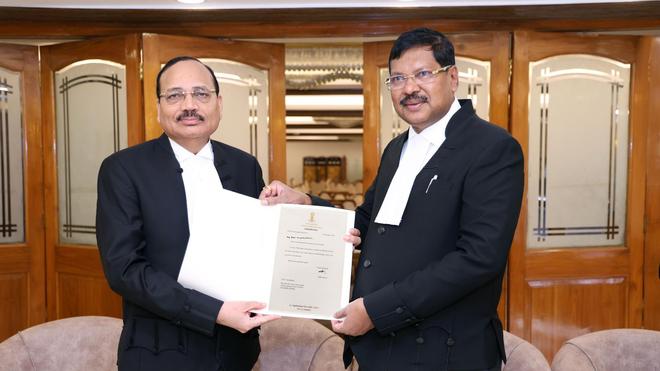By Gitanjali Thorat | PR Desk
New Delhi: Chief Justice of India B.R. Gavai has recommended Justice Surya Kant, the senior-most judge of the Supreme Court, as his successor to the country’s top judicial office. Justice Kant is set to become the 53rd Chief Justice of India (CJI) once the formal appointment process concludes.
The recommendation, made on Monday, came soon after Chief Justice Gavai returned from an official visit to Bhutan. He personally handed over the recommendation letter and met Justice Kant on the first working day after the Deepavali break.Chief Justice Gavai is due to retire on November 24, marking the end of his tenure that began in May 2024.
Appointment of the CJI
Under the Memorandum of Procedure, the Law Ministry seeks the outgoing Chief Justice’s recommendation, usually the senior-most Supreme Court judge. The Prime Minister then advises the President to appoint the new CJI under Article 124(2).
About Justice Surya Kant
Born on February 10, 1962, in Hisar, Haryana, Justice Surya Kant holds a Bachelor’s degree in Law from Maharishi Dayanand University, Rohtak (1984).He began his legal career at the Hisar District Court, later moving to the Punjab and Haryana High Court in 1985, where he built a strong reputation in constitutional, service, and civil law.
At just 38, he became the youngest Advocate-General of Haryana in 2000 and was designated a Senior Advocate in March 2001. He was elevated to the Punjab and Haryana High Court as a judge in 2004, later serving as the Chief Justice of the Himachal Pradesh High Court from October 2018.In May 2019, he was appointed to the Supreme Court of India.
Key Cases and Judicial Contributions
Justice Surya Kant has been part of several landmark Supreme Court benches and judgments that have shaped India’s legal and constitutional landscape:
•Article 370 Abrogation Case: He was part of the five-judge Constitution Bench that upheld the abrogation of Article 370, affirming the validity of the Union government’s move to remove Jammu and Kashmir’s special status.
•Electoral Bonds Judgment: Justice Kant was on the five-judge bench that struck down the electoral bonds scheme as unconstitutional, citing violation of transparency in political funding.
•Pegasus Spyware Case: He contributed to proceedings that scrutinized alleged surveillance through Pegasus spyware, underscoring the need for privacy protection.
•Sedition Law Suspension: He was part of the bench that suspended the colonial-era Section 124A (sedition), emphasizing its misuse and need for legislative reconsideration.
These cases highlight his constitutional clarity, balanced reasoning, and progressive outlook—traits that now position him to lead the judiciary.








